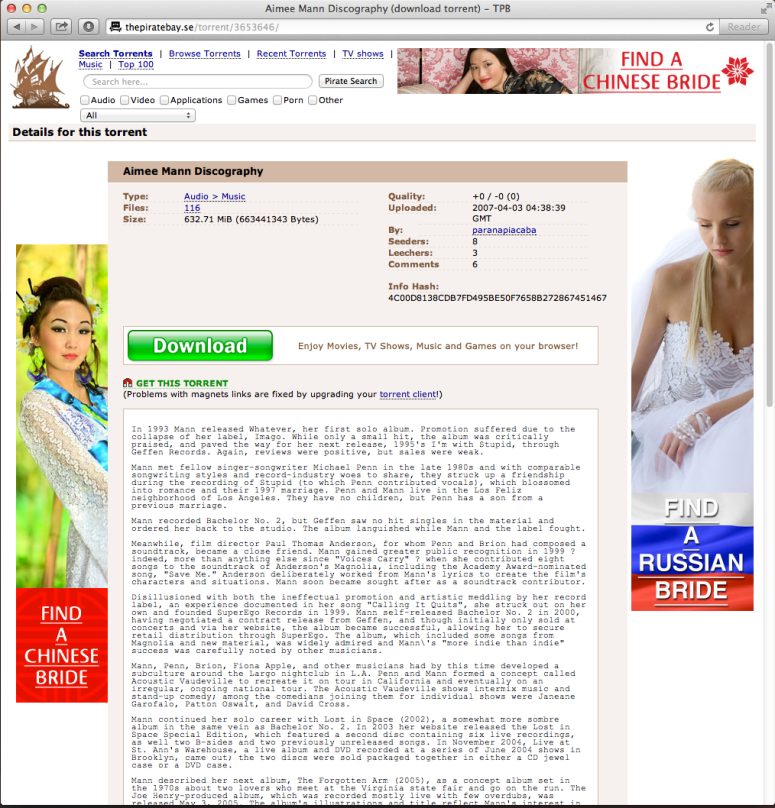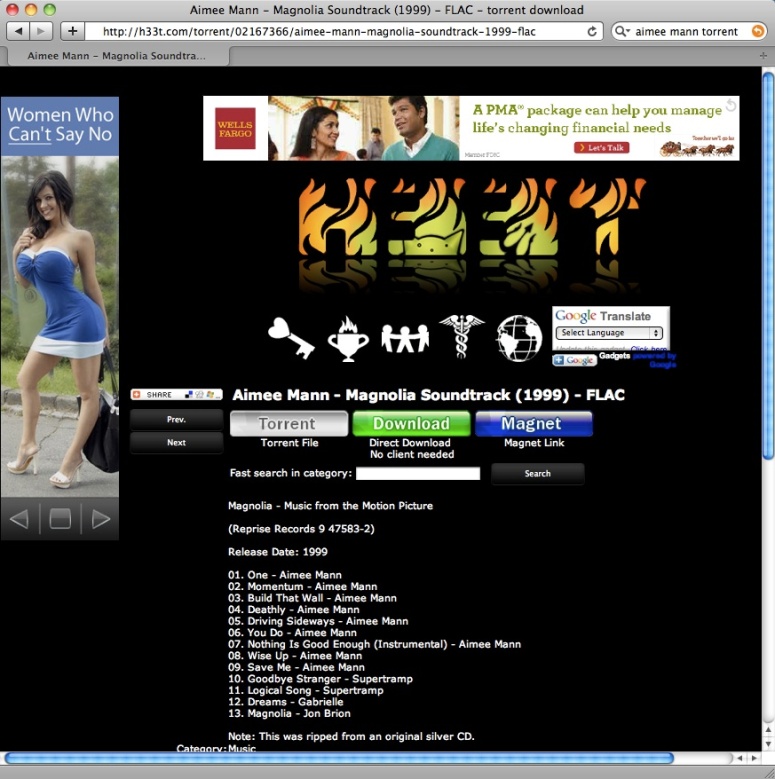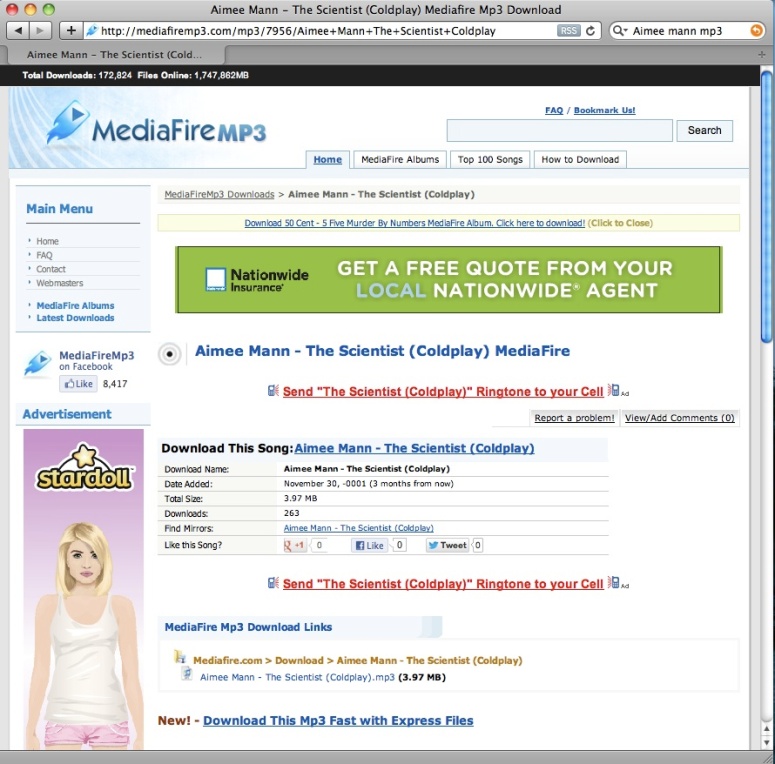When an artist signs a contract with a record label and publishing company there is a customary clause that governs how the artists music can be used in association with brands, marketing and the context of commercial placements including films and television shows. This provision grants the artist authority and control over how they are represented to the world and often coincides with the artists personal values (such as political campaign uses). These concepts track the laws against misappropriation of the artist’s right of publicity and laws against falsely implied endorsements. Not to mention the moral rights of artists.
The online exploitation of artists work, beyond the obvious illegal distribution of their work without permission or compensation now extends into brands leveraging the appeal of the artist to promote their product or service (like banking or insurance). In the examples below both Wells Fargo Bank and Nationwide Insurance are specifically benefiting from gaining direct access to fans of Aimee Mann. Unfortunately Aimee is not consulted, has not been given rights of approval, and last but not least, is not being compensation for the value her brand brings to these companies.
But it get’s worse. We’ve been reading a lot about how human trafficking has become a real problem online. We don’t know that the sites specifically advertising on The Pirate Bay are operating illegally, but they are most likely not the type of advertiser or service that we could imagine an artist such as Aimee Mann supporting.
So to add insult to injury, not only do brands run roughshod over artists’ rights to compensation for the consumption of their work, but they also ignore the artists’ right to control how they are represented to their peers and to the public. Major brands literally trade off the artist’s name by associating their products with the artist. And the worst of it is, there are businesses that may be profiting from human trafficking and also using the artists name and work to promote that human suffering.
Isn’t it about time that everyone stopped playing games and start holding those bad actors responsible and accountable–beginning with the brands and advertising networks that make it possible?




This article is really a stretch. Shouldn’t the focus be moreso that Aimee’s music is available on these sites without her getting any compensation for it? These dating sites, Wells Fargo, etc. didn’t steal her music and aren’t “exploiting” her; at least, not intentionally. They bought “run of site” advertising on a network. These sites just happen to be affiliates of that network.
Whether or not these dating sites have other, nefarious purposes, is really beside the point. I feel you’re just really over-reaching here.
The point is that (A) the brands involved are supporting theft of Aimee Mann and many other artists, not only by paying a portion of their advertising revenue to the pirate site, but (B) also by benefiting from clicks on their own advertising.
The pirate sites would like to make it about money and might even be willing to pay an artist a share of their revenue–for sales of advertising sustaining the theft that the artist did not want on the site in the first place.
Paying the artist money they didn’t ask for and may not want for advertising sold by people stealing their music or otherwise using it without the artist’s permission to drive advertising eyeballs is not just blaming the victim, it’s trying to buy off the victim after the crime has occurred. What if the victim didn’t want to be a victim? It seems that you want to do everything except ask the artist if they want to be on the site in the first place, and if they did, how much they would want to participate.
And why don’t you want to ask the artists what they’d like? Maybe because they might say no in such numbers the site would have no traffic? Or is it because The Man 2.0 doesn’t care what little artists think when there’s nobody to stop The Man 2.0 from actually stealing the artists recordings. Not even a record company would have the brass for that level of piggery.
You could say to yourself, there’s a crowd, let’s go sell them jeans who cares why their standing around, it’s a captive audience, dude. Then when you realize the crowd formed in order to beat the living daylights out of an artist and steal their money, instead of calling the police, you blame the artist for not being willing to share more of their money with the mob so you can sell more jeans.
You would also have to add the complexity that each of the brands is very likely to have a provision in its contract with its ad agency, who in turn has a downstream prohibition, on selling ads on pirate sites. And yet there is sure to be a tempting crowd standing around beating up the artist who the adnetworks and real time bidding companies want to sell to–meaning that there are humans in that chain somewhere who know exactly what they are doing and that it violates contracts.
Everyone who is involved in the chain knows what’s going on. But there’s also a reason why you just don’t see some brands on these pirate sites–most likely because they enforce their agreements.
Google says follow the money–we know where it starts and we know where it stops. What happens in between is for the cops to handle with Google. If the crime goes up to the brand or down through the ad exchange and real time bidding to the pirate, so be it. It’s called RICO. Expect it.
It seem you do a lot of complaining about “Company X is advertising on Illegal Downloading Sit Y.” And while I get it… blogging about it feels like the wrong tactic for the end result you want (artists to get paid for their art). Seems like a well worded letter to Company X
Also, haven’t you ever heard about AdBlock? We even bother to look at ads?
Google suggests that artists and others that are victim to enterprise level piracy for profit follow the money. That’s what we’re doing, right to where it originates…
a stretch? a Loooooooong one. I think there are way more people sharing or reading this for the purpose of humor and LOL’ing.